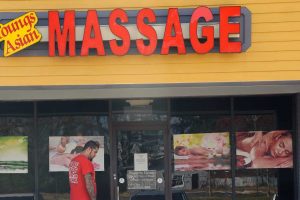Suspect in Atlanta-area spa killings indicted on murder, domestic terror charges, could face hate crimes

The suspect in a string of fatal shootings at Atlanta-area massage parlors was indicted Tuesday on domestic terror and murder charges, and prosecutors signaled they will also seek hate crime charges – something advocates have been pushing since the March slayings rattled the Asian-American community.
Robert Aaron Long was officially indicted by a Fulton County grand jury for the fatal shootings of four people killed at two spas in Atlanta: Suncha Kim, 69; Soon Chung Park, 74; Hyun Jung Grant, 51; and Yong Ae Yue, 63. The indictment does not cover the four others who were killed at another massage parlor in Cherokee County.
The indictment charges Long with one count of domestic terrorism, four counts of murder, four counts of felony murder, five counts of assault with a deadly weapon, and four counts of possession of a firearm during the commission of a felony.
The domestic terrorism charge — which aren’t frequently used against accused mass shooters due to legal red tape — says Long committed a series of illegal acts “which were interrelated by distinguishing characteristics, with the intent to cause serious bodily harm and to kill individuals and groups of individuals, and with the intent to intimidate the civilian population of this state and of its political subdivisions.”
While mass shootings are often widely denounced as terrorism or a hate crime, a number of legal concerns often stand in the way of these charges being filed. The terms have legal definitions that vary by state and domestic terrorism isn’t a charge on the books at the federal level. There’s also no federal list of domestic terrorist organizations, such as there is for foreign groups.
Some experts say the frequent lack of such charges by prosecutors is a result of institutional and systemic racism and misogyny.
It will be up to a separate grand jury in Cherokee County to decide on charges in the shooting at a spa near suburban Woodstock in which four were killed and one person was wounded.
Fulton County District Attorney Fani Willis also filed notice that she intends to seek hate crime charges and the death penalty against Long, who is white. The hate crime charges are based on actual or perceived race, national origin, sex and gender, according to online records.
Georgia’s new hate crimes law does not provide for a stand-alone hate crime. After a person is convicted of an underlying crime, a jury must determine whether it’s a hate crime, which carries an additional penalty.
Authorities say Long opened fire first at Young’s Asian Massage Parlor in a strip mall off Highway 92 near a rural area in Acworth, about 30 miles north of Atlanta. Four people died in the attack.
An hour later, two other shootings occurred across the street from each other in Atlanta on Piedmont Road, at the Gold Spa and the Aromatherapy Spa. Four more died in the set of shootings.
After the attack, authorities said Long, 21, claimed his actions were not racially motivated and he frequented some of the spas where the shootings happened. Cherokee County Sheriff’s Office spokesman Capt. Jay Baker said Long viewed the spas, which are all listed on a prominent illicit massage parlor matching website, as “a temptation that he wanted to eliminate.”
Baker said Long believed there was “some type of porn industry” in Florida that he intended to confront and that he was on his way to the state when he was apprehended.
The killings came amid a wave of attacks against Asian Americans that coincided with the spread of the coronavirus across the United States. Of the eight people killed, six were women of Asian descent. Hate crimes against Asian-Americans have been spiking in recent months, and many advocates pushed for hate crime charges in the case, saying the Asian-American businesses were targeted.
Marcus Lyon, 31, looks at flowers and other memorial items left at the scene of a shooting in Acworth, Georgia. Lyon was inside the Young's Asian Massage spa on March 16 when the shooter came in, and Lyon ducked behind a massage table to hide. (Photo: Trevor Hughes-USA TODAY NETWORK)
Long had been in rehab for sex addiction and was wracked with guilt about his sexual urges, according to two people who lived with him in transitional housing. He was deeply religious and could not control his desire to visit massage parlors and engage in sexual acts, something that sent him into deep bouts of depression, said Tyler Bayless, who lived with Long for six months in 2019 and 2020.
Contributing: Associated Press
Source: Read Full Article
